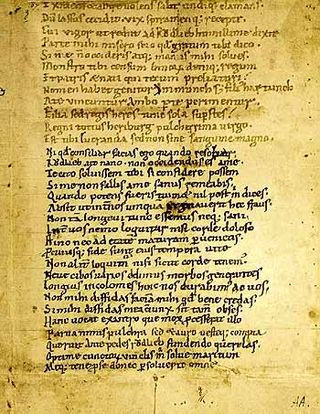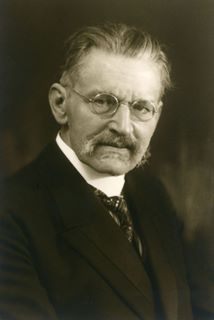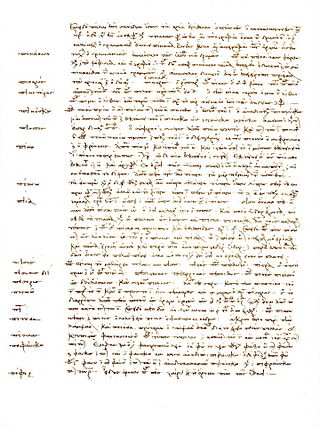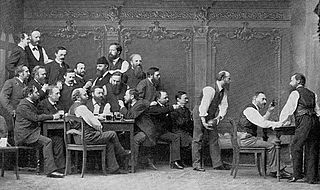Related Research Articles

Karl Krumbacher was a German scholar who was an expert on Byzantine Greek language, literature, history and culture. He was one of the principal founders of Byzantine Studies as an independent academic discipline in modern universities.

Karl Otfried Müller was a German professor, scholar of classical Greek studies and philodorian.
Károly Kerényi was a Hungarian scholar in classical philology and one of the founders of modern studies of Greek mythology.

Helmut Rix was a German linguist and professor of the Sprachwissenschaftliches Seminar of Albert-Ludwigs-Universität, Freiburg, Germany.

Ruodlieb is a fragmentary romance in Latin verse written by an unknown southern German poet who flourished about 1030. He was almost certainly a monk of the Bavarian Tegernsee Abbey.
Gargara was an ancient Greek city on the southern coast of the Troad region of Anatolia. It was initially located beneath Mount Gargaron, one of the three peaks of Mount Ida, today known as Koca Kaya. At some point in the 4th century BCE the settlement moved approximately 5.8 km south of Koca Kaya to a site on the small coastal plain near the modern villages of Arıklı and Nusratlı, at which point the previous site came to be known as Old Gargara. Both sites are located in the Ayvacık district of Çanakkale Province in Turkey.

Heinrich Suter was a historian of science specializing in Islamic mathematics and astronomy.

Richard August Reitzenstein was a German classical philologist and scholar of Ancient Greek religion, hermetism and Gnosticism. He is described by Kurt Rudolph as “one of the most stimulating Gnostic scholars.” With Wilhelm Bousset, he was one of the major figures of the Religionsgeschichtliche Schule.

Etymologicum Magnum is the traditional title of a Greek lexical encyclopedia compiled at Constantinople by an unknown lexicographer around 1150 AD. It is the largest Byzantine lexicon and draws on many earlier grammatical, lexical and rhetorical works. Its main sources were two previous etymologica, the so-called Etymologicum Genuinum and the Etymologicum Gudianum. Other sources include Stephanus of Byzantium, the Epitome of Diogenianus, the so-called Lexicon Αἱμωδεῖν (Haimōdeῖn), Eulogius’ Ἀπορίαι καὶ λύσεις, George Choeroboscus’ Epimerismi ad Psalmos, the Etymologicon of Orion of Thebes, and collections of scholia. The compiler of the Etymologicum Magnum was not a mere copyist; rather he amalgamated, reorganised, augmented and freely modified his source material to create a new and individual work.

This article lists and briefly discusses the most important of many military treatises on military science produced in the Byzantine Empire.
Oros of Alexander was a late classical/Byzantine lexicographer and grammarian active in the mid-5th century. According to the Suda he was born in Alexandria and taught in Constantinople. The Suda lists ten titles by him, but little of his work survives.

Papyrus 6, designated by 𝔓6 or by ε 021, is a fragmentary early copy of the New Testament in Greek and Coptic (Akhmimic). It is a papyrus manuscript of the Gospel of John that has been dated paleographically to the 4th century. The manuscript also contains text of the First Epistle of Clement, which is treated as a canonical book of the New Testament by the Coptic Church. The major part of the codex is lost.
Minuscule 261, ε 282 (Soden), is a Greek minuscule manuscript of the New Testament, on parchment. Palaeographically it has been assigned to the 12th century. It has full marginalia.
Minuscule 262, ε 1020 (Soden), is a Greek minuscule manuscript of the New Testament, on parchment. Palaeographically it has been assigned to the 10th century. It has marginalia.
Minuscule 279, ε 293 (Soden), is a Greek minuscule manuscript of the New Testament, on parchment. Palaeographically it has been assigned to the 12th century. It has full marginalia.
Minuscule 294, ε 367 (Soden), is a Greek minuscule manuscript of the New Testament, on parchment, dated by a colophon to the year 1391. It has marginalia.

Martin Schanz was a German classicist and Plato scholar. He was a Dozent and Professor at the University of Würzburg from 1867 to 1912, and is especially known for his history of Roman literature and his ground-breaking, critical edition of Plato's dialogues.
Bernhard Schweitzer was a German classical archeologist.

Franz Rühl was a German historian who published numerous works in the field of classical history. He was a son-in-law to anatomist Jacob Henle.
The Samareitikon is the name given to the Greek translation of the Samaritan Pentateuch.
References
- ↑ Reitzenstein (1897) 1-69; Alpers (1969) 3-24; Alpers (1989)
- ↑ Berger (1972); Rance (2007) 201-206
- ↑ Reitzenstein (1897) 11-44
- ↑ Colonna (1967); Alpers (1969); Berger (1972)
- ↑ Alpers (1969)
- ↑ Lasserre and Livadaras (1976- )
- ↑ E. Duke, Review of Lasserre and Livadaras (1976), The Classical Review (N.S.) 28 (1978) 295-297